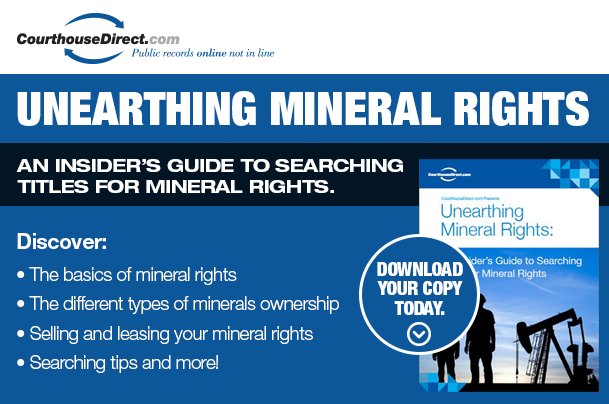
If you are considering buying a property or are currently a landowner, it’s important to understand your legal ownership level. Some sales include surface rights only, while others include surface and mineral rights to the land. Often, inexperienced landowners don’t know how to differentiate the two and make purchasing decisions that are not in their best interests.
Sometimes owners are surprised to find they are not legally authorized to participate in an oil or gas lease on their land, because the purchase included surface rights only. When purchasing land, be sure to research all surface and mineral rights to avoid costly mistakes.
What are Surface Rights?
Surface rights include ownership of most visible aspects on a property. Surface rights include physical structures, trees, plants, and water. In some states, surface rights only include ownership to a particular soil depth. For example, you have enough soil ownership to plant trees or other plants but may not be able to drill for oil and gas. In Colorado, Louisiana, New Mexico, Oklahoma, Pennsylvania, and Texas, owner’s rights are split between surface rights and mineral rights.
In states with split ownership laws, land can be sold to only include surface rights. This means that if oil or gas is present under the soil, the landowner will have no legal rights to them. If approached by an oil or gas company for exploration or extraction, the owner will have no legal ownership over what is in the ground. To legally own and manage minerals, oil, or gas under the ground, the landowner must also have mineral rights.
What are Mineral Rights?
In some states, surface and mineral rights are granted upon sale of the property. For landowners residing in states that split ownership, mineral rights are not guaranteed during a land purchase. Mineral rights allow landowners to explore, extract, and sell natural elements discovered on their property.
Landowners with mineral rights have legal ownership of all gas, oil, gold, silver, copper, iron, or other minerals elements below the soil of their land. Owners can also lease or sell these rights to the government or private entities for a profit. Many landowners with mineral rights lease their property to oil and gas companies, collecting a portion of the profits. If landowners had not purchased the mineral rights to their property, they would have lost valuable income.
Surface and Mineral Rights
It’s important to remember that in states with split land ownership rights, surface rights are subservient to mineral rights. This means that if the party with mineral rights wants to excavate a property held by owners only holding surface rights, they do not need to receive permission from surface right owners to do so. For those who hold only surface rights, this can be disruptive and frustrating.
Land Rights in Texas
Texas is one of the states with split ownership of mineral and surface rights. The state considers the two to be separate estates. Landowners with mineral and surface rights to their land can extract unlimited minerals, gas, or oil from the land. Owners with dual ownership can sell, lease, and profit from underground resources on their land. As with other states with split ownership, landowners with only surface rights do not legally own natural elements under the soil. Without mineral ownership, a surface landowner will never profit from the natural elements on the land.
Rights of Surface Landownership
Texas law provides an accommodation doctrine to secure the rights of landowners only holding surface rights to their property. If another party holds the mineral rights to a property, the mineral owners must plan and limit exploration if it conflicts with current surface use. If the land is in a metropolitan area, there may be limitations to the exploration and extraction. The property transfer or sales contract will outline these rights.
Damage to the Surface by Third Party
In cases where surface and mineral owners are different, there may be a need to compensate for surface damage acquired during exploration or extraction of natural elements. Types of surface damage can vary, but there are common clauses included in contracts limiting the effects suffered by the surface land owner.
No Surface Operations
Some operations can be limited by clauses in a surface land owner’s purchase contract. The surface landowner can restrict oil wells, pipelines, or roads for all or part of the land. These clauses are not always possible but can be established in some cases to protect the land surface.
Surface Damage Payment
When a land is used as a means of income for logging, agriculture, or livestock, loss of income compensation can be awarded for disruptions. For example, if an oil well is placed in a grazing pasture, the loss of income accrued can be a source of compensation from the oil or gas company.
Water-Related Clauses
During oil and gas extraction, water is a requirement; companies use water resources on the land it is drilling. When water from the local land is used during the drilling process, the surface owner can be compensated. If water sources on the land are damaged, the company will pay for damages.
No-Drilling Clause
Some clauses can include an agreement between parties restricting drilling in a certain area. For example, if a surface landowner requested no drilling be performed within 1,000 feet of a structure, a clause will be added to honor the request.
The Separation of Surface and Mineral Rights in Texas
Before entering a purchase contract for any size property, buyers must be aware of the type of ownership involved. Many buyers moving from out of state may not realize there is split ownership of mineral and surface rights. Purchasing both mineral and surface rights to a property will ensure owners never lose control over their land. Leaving mineral rights in the hands of a separate party will leave surface owners vulnerable to how their land is used. It is always in the best financial and legal interests of surface landowners to also purchase the property’s mineral rights.






















